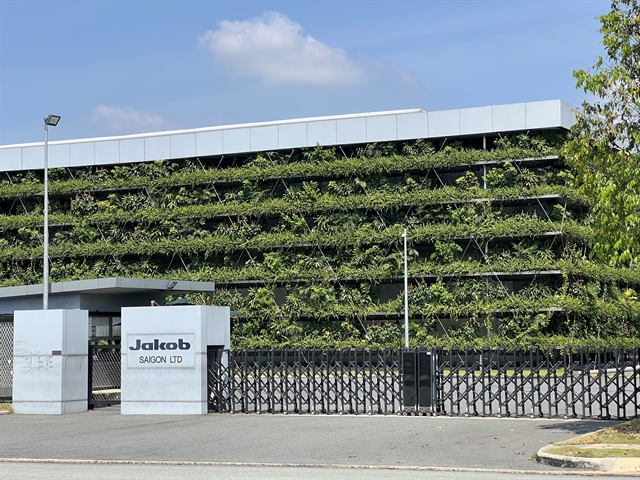 Environment
Environment

 |
| The Jakob Sài Gòn Co., Ltd. factory in the Việt Nam–Singapore Industrial Park is a standout example of green transition in Bình Dương. — VNA/VNS Photo |
HÀ NỘI — The Government has released a national plan aimed at tackling climate change, improving natural resource management and protecting the environment.
It sets clear goals to be achieved by 2030, including the completion of climate-resilient infrastructure and improved capacity for disaster prevention and adaptation.
Priority is given to building resilience across natural ecosystems, the economy and communities, while investing in smart adaptation strategies.
Forecasting and early warning systems will be enhanced to mitigate the impacts of extreme weather events, with a particular focus on ensuring human safety during storms and floods.
Authorities aim to ensure that most households in disaster-prone areas will have access to safe housing.
On emissions reduction, the plan seeks to curb greenhouse gas emissions compared to 'business-as-usual' scenarios, promote energy conservation and increase the share of renewable energy in the national energy mix.
In natural resource management, the Government will speed up mapping of key mineral and marine resources, expand geological surveys and assess coastal and offshore areas. Sustainable water use is a priority, with tighter controls, more efficient irrigation and reduced losses.
Measures will be taken to address water scarcity and drought during the dry season, particularly in the south-central region, the Central Highlands, the Mekong Delta and remote island communities.
The plan also aims to maintain 3.5 million hectares of land for rice cultivation to ensure food security and economic development.
In terms of environmental protection, the Government aims to ensure that all industrial zones are equipped with centralised wastewater treatment systems that meet national standards.
More than half of the domestic wastewater in second-tier urban areas and above is expected to be treated properly.
Contaminated land, particularly areas heavily polluted by toxic chemicals and dioxins left over from wartime, will be fully remediated.
Air quality in urban centres and densely populated areas will be improved, with clean water access expanded to rural and urban residents alike.
Public awareness campaigns will be scaled up to promote a unified understanding and proactive response to climate change and environmental issues.
The Government is calling for a nationwide shift in behaviour towards sustainable consumption, green growth, low-carbon development and the circular economy.
Special attention will be given to early environmental education for children, starting from primary school.
The plan also outlines efforts to update and strengthen legal frameworks on climate action and environmental governance.
A new national strategy will be developed to address non-traditional security threats by 2030, with a vision to 2045.
Administrative structures at both central and local levels will be streamlined for greater efficiency and responsiveness in climate and environmental management.
To ensure coherence across sectors and regions, integrated policy mechanisms and inter-agency coordination will be improved. Financial instruments and market-based tools will be used to mobilise resources for climate resilience and environmental protection. Key environmental laws will be revised, including those governing meteorology and hydrology, energy efficiency, marine resources, biodiversity and forestry.
The national strategy for green growth will be implemented effectively through 2030, with a long-term vision to 2050. Pilot models of green urban and rural economies will be promoted and scaled up, alongside initiatives that support sustainable production and consumption.
The Government will also prioritise investment in tackling environmental degradation, biodiversity loss, and resource depletion, while working towards the long-term goal of achieving net-zero emissions. Comprehensive programmes and projects will be launched in the 2026–2030 period to address urgent environmental issues and advance national climate adaptation efforts.
Việt Nam will carry out its national circular economy action plan through 2035, with ministries and localities developing their own roadmaps tied to digital transformation.
Research and pilot projects will guide adoption across sectors, while the Government reviews material use to shape sustainable resource policies. — VNS




